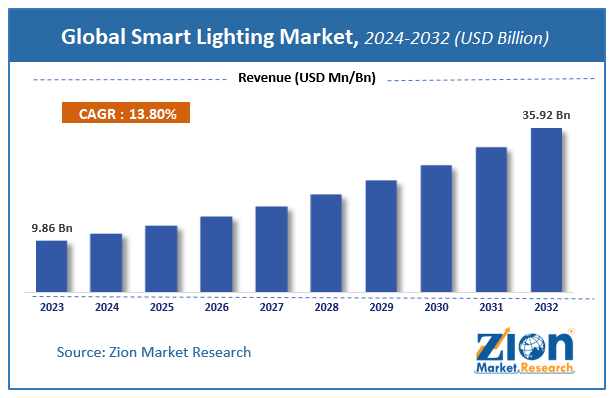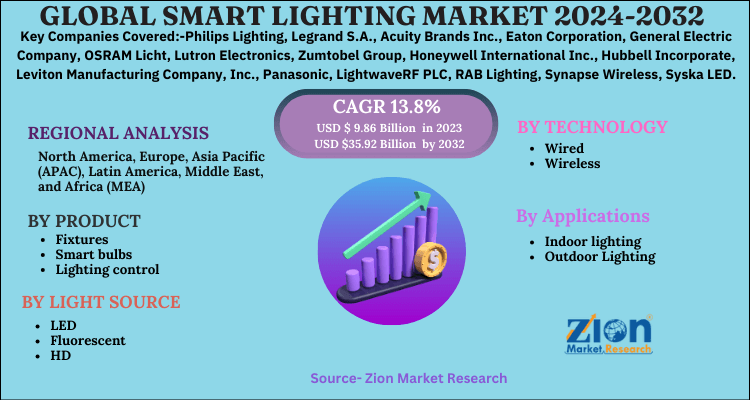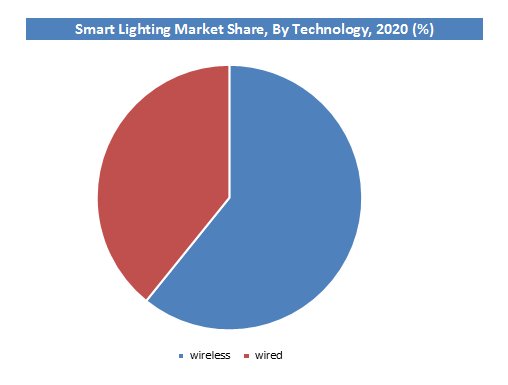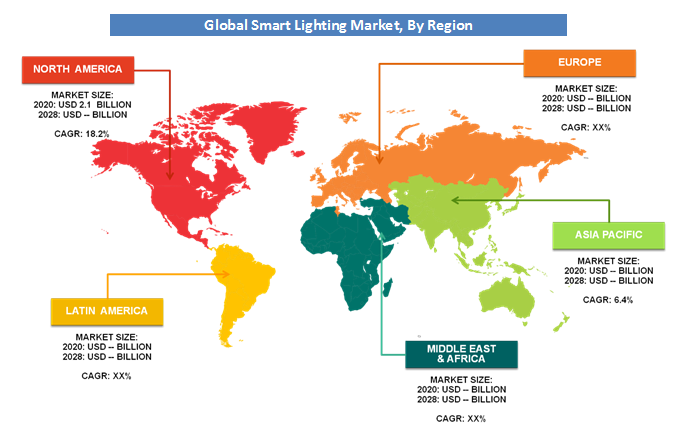Smart Lighting Market Size, Share, Industry Trends Report, 2032

Smart Lighting Market By Product (Fixtures, Smart bulbs, Lighting Control and others), By Light Source (LED, Fluorescent, HD and Others), By Technology (Wired and Wireless), By Applications (Indoor Lighting and Outdoor Lighting), By End-user (Residential, Commercial, Government, Industrial and Others), and By Region: Global Industry Perspective, Comprehensive Analysis and Forecast, 2024 - 2032
| Market Size in 2023 | Market Forecast in 2032 | CAGR (in %) | Base Year |
|---|---|---|---|
| USD 9.86 Billion | USD 35.92 Billion | 13.8% | 2023 |
Smart Lighting Market Insights
According to Zion Market Research, the global Smart Lighting Market was worth USD 9.86 Billion in 2023. The market is forecast to reach USD 35.92 Billion by 2032, growing at a compound annual growth rate (CAGR) of 13.8% during the forecast period 2024-2032.
The report offers a comprehensive analysis of the market, highlighting the factors that will determine growth, potential challenges, and opportunities that could emerge in the Smart Lighting Market industry over the next decade.
Smart lighting was a revolution in the lighting industry that uses a control system that intelligently controls light, based on parameters such as temperature, movement, occupancy, amount of natural light, etc. Traditional lighting consumes a high energy cost, thus Industries and government departments are focusing on reducing energy utilization by substituting traditional lighting systems with efficient and advanced lighting control systems. Alongside, providing with providing economical and flexible lighting, automated lighting control also monitors the tasks carried out by the users.
COVID-19 Impact Analysis
Covid-19 has eternally impacted a lot of industries and it has become difficult for each business to increase sales and production. Although, the smart lighting market is expected to recover its business in the first quarter of the coming year. The smart lighting industry is trying to take stock of the situation and take necessary measures to ensure cost-effectiveness and increase the overall demand for the product. It is expected to grow tremendously in the forecasted period.
Smart Lighting Market: Growth Factors
Upcoming smart city projects, the advent of integrated lighting control systems, increasing adoption and decreasing cost of LEDs, integration of lighting solutions with smart devices, and growing awareness about energy savings among consumers and governments worldwide are some of the major reasons to drive the market growth of smart lighting systems. It is forecasted that it will show tremendous growth in the coming years.
Also, with the expected increase in high-speed wireless technology, indoor lighting infrastructure is becoming more prominent, as it is cost-effective and hence foresees a lot of opportunities for smart lighting applications. The shift in consumer lifestyle due to the increasing youth population, and demand for interior lighting especially in hotels and offices are sure to create a surge in the market. The consumption of global energy in buildings is one-third, and smart lighting offers various opportunities for reducing emission activities.
Smart Lighting Market: Report Scope
| Report Attributes | Report Details |
|---|---|
| Report Name | Smart Lighting Market |
| Market Size in 2023 | USD 9.86 Billion |
| Market Forecast in 2032 | USD 35.92 Billion |
| Growth Rate | CAGR of 13.8% |
| Number of Pages | 210 |
| Key Companies Covered | Philips Lighting, Legrand S.A., Acuity Brands Inc., Eaton Corporation, General Electric Company, OSRAM Licht, Lutron Electronics, Zumtobel Group, Honeywell International Inc., Hubbell Incorporate, Leviton Manufacturing Company, Inc., Panasonic, LightwaveRF PLC, RAB Lighting, Synapse Wireless, Syska LED, Wipro Enterprise Ltd, and LG Electronics, among others |
| Segments Covered | By Product, By Light Source, By Technology, By Applications, By End User, and By Region |
| Regions Covered | North America, Europe, Asia Pacific (APAC), Latin America, Middle East, and Africa (MEA) |
| Base Year | 2023 |
| Historical Year | 2018 to 2022 |
| Forecast Year | 2024 - 2032 |
| Customization Scope | Avail customized purchase options to meet your exact research needs. Request For Customization |
Smart Lighting Market: Segmentation Analysis
By Technology Segment Analysis
By technology, the segment is bifurcated into wired and wireless communications. Wireless technology is to experience significant growth in the forecasted period owing to the fact that consumers are demanding more smart LED lighting systems for residential end-use applications which can be remotely controlled and single-handedly enable self-learning mode via WIFI transmission.
Also, in the diverse digital communication interfaces planned for smart lighting, Wi-Fi is suitable for the programming of predefined areas and spaces.
By Applications Segment Analysis
Based on applications, the market is sub-segmented into indoor lighting and outdoor lighting. The market for outdoor lighting is expected to grow at a higher rate owing to factors like increasing focus on improving connectivity by constructing roads and installing smart lights for roads, especially in the developing countries in the APAC region, which would spur the growth for the outdoor market.
Smart Lighting Market: Regional Analysis
The European region held a share of 56.7% in 2023. This is attributable to the presence of top companies. Moreover, the increasing usage of IoT and usage mainly in commercial buildings, automobile applications, and outdoor lighting is expected to generate huge demand for the market in this region.
The Asia Pacific region is projected to grow over the forecast period. This surge is due to the increasing adoption and creation of smart infrastructure in the region, scaled establishment of smart lighting framework over the private and commercial sectors, and increasing investments by the government in public infrastructure.
Smart Lighting Market: Competitive Analysis
Some of the major players in the global Smart Lighting market include:
- Philips Lighting
- Legrand S.A.
- Acuity Brands Inc.
- Eaton Corporation
- General Electric Company
- OSRAM Licht
- Lutron Electronics
- Zumtobel Group
- Honeywell International Inc.
- Hubbell Incorporate
- Leviton Manufacturing Company, Inc.
- Panasonic
- LightwaveRF PLC
- RAB Lighting
- Synapse Wireless
- Syska LED
- Wipro Enterprise Ltd
- LG Electronics
Companies are also focusing on launching new products to enhance their product offerings and focusing on mergers and acquisitions to gain a competitive advantage in the market. For instance, in October 2019, Signify acquired Cooper Lighting Solutions from Eaton.
The global Smart lighting market is segmented as follows:
By Product
- Fixtures
- Smart bulbs
- Lighting control
- Others
By Light Source
- LED
- Fluorescent
- HD
- Others
By Technology
- Wired
- Wireless
By Applications
- Indoor lighting
- Outdoor Lighting
By End-User
- Residential
- Commercial
- Government
- Industrial
- Others
By Region
- North America
- The U.S.
- Canada
- Europe
- France
- The UK
- Spain
- Germany
- Italy
- Rest of Europe
- Asia Pacific
- China
- Japan
- India
- South Korea
- Southeast Asia
- Rest of Asia Pacific
- Latin America
- Brazil
- Mexico
- Rest of Latin America
- Middle East & Africa
- GCC
- South Africa
- Rest of the Middle East & Africa
Table Of Content
Methodology
FrequentlyAsked Questions
According to a study, the global Smart Lighting market size was worth around USD 9.86 billion in 2023 and is expected to reach USD 35.92 billion by 2032.
The global Smart Lighting market is expected to grow at a CAGR of 13.8% during the forecast period.
Some of the key factors driving the global Smart lighting market growth are advent of integrated lighting control systems, increasing adoption and decreasing cost of LEDSs, integration of lighting solutions with smart devices, and growing awareness about energy savings among consumers and governments.
North America region held a substantial share of the Smart lighting market in 2020. This is attributable to the presence of major players such as General Electric Company, LightwaveRF PLC and RAB Lighting, among others. Asia Pacific region is projected to grow at a significant rate owing to the rising demand for smart lighting in developing economies such as China and India.
Some of the major companies operating in the Smart lighting market are Philips Lighting, Legrand S.A., Acuity Brands Inc., Eaton Corporation, General Electric Company, and OSRAM Licht, Lutron Electronics, Zumtobel Group, Honeywell International Inc., Hubbell Incorporate, and Leviton Manufacturing Company, Inc., Panasonic, LightwaveRF PLC, RAB Lighting, Synapse Wireless, Syska LED, Wipro Enterprise Ltd, and LG Electronics, among others.
Choose License Type
RelatedNews
HappyClients
Zion Market Research
Tel: +1 (302) 444-0166
USA/Canada Toll Free No.+1 (855) 465-4651
3rd Floor,
Mrunal Paradise, Opp Maharaja Hotel,
Pimple Gurav, Pune 411061,
Maharashtra, India
Phone No +91 7768 006 007, +91 7768 006 008
US OFFICE NO +1 (302) 444-0166
US/CAN TOLL FREE +1 (855) 465-4651
Email: sales@zionmarketresearch.com
We have secured system to process your transaction.
Our support available to help you 24 hours a day, five days a week.
Monday - Friday: 9AM - 6PM
Saturday - Sunday: Closed









